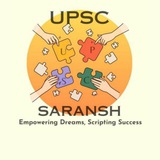Works of scholars Section A PAPER 1 (1).pdf
225.1 KB
For PSIR OPTIONAL Students
There are 25 PYQs with one of the best answers along with some value addition.
These 25 Ques of section B paper 1 of PSIR OPTIONAL is based on the themes of last 20 years of upsc papers .
These 25 Ques of section B paper 1 of PSIR OPTIONAL is based on the themes of last 20 years of upsc papers .
Section B Paper 1 Model Ans (1).pdf
7.9 MB
Section B Paper 1 Model Ans (1).pdf
